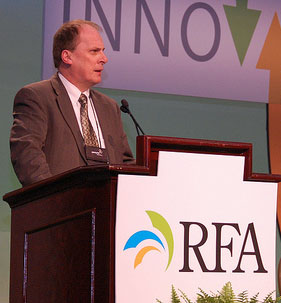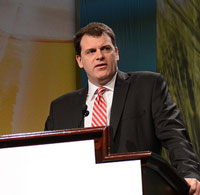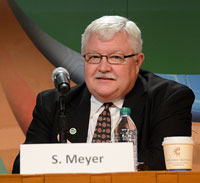Automakers will need higher octane fuels to meet the coming increases in fuel economy and reductions in emissions called for by 2025 and ethanol is positioned to help fill that need.
According to a new study by auto engineering firm Ricardo, Inc., the increase in average fleet fuel economy to 54.5 mile per by 2025 will have to be met in large part by engines and vehicles popular today, which is about double the average of 2010. Ricardo notes, “[t]he vast majority of vehicles sold through 2025 in the United States will use gasoline-fueled, spark-ignited internal combustion engines as the primary form of propulsion.”
Specifically, Ricardo reports that nearly 3 out of every 4 vehicles will require a gasoline-type, higher octane fuel to operate a growing list of engine technology options. “Future powertrain solutions will have a natural thirst for higher octane fuels,” Ricardo concludes. Octane is the standard measure of the anti-knock properties (i.e., engine performance) of a motor fuel. Most fuels today, including E10 ethanol blends, have an octane rating of at least 87.
 Speaking at the 17th annual National Ethanol Conference, Ricardo project director Rod Beazley said the meeting should be called the “National Octane Conference” because “ethanol has sort of a bad rap with the autos and it might need to re-market itself.”
Speaking at the 17th annual National Ethanol Conference, Ricardo project director Rod Beazley said the meeting should be called the “National Octane Conference” because “ethanol has sort of a bad rap with the autos and it might need to re-market itself.”
Beaszley says he doesn’t agree with the timing of the Renewable Fuel Standard (RFS). “If I was king for the day, you’d be getting the 36 billion gallons by 2017,” he said. “That would be the challenge – how to accelerate it by five years.”
He called for an alliance with auto makers who have a tremendous challenge ahead of them to increase fuel economy. “I think there’s a huge opportunity for the renewable fuels industry to grow and to have a very strong partnership with the autos,” he said. “There’s never been a better time for the industry than now.”
Listen to or download Beazley from NEC here: Ricardo Inc. Project Manager Ron Beazley


 It was the main topic of the president’s press conference today and Congress will be holding hearings on it this week. From the president to the people at the pump, everyone is talking about higher gasoline prices these days, but ethanol is actually helping to keep them lower than they could be.
It was the main topic of the president’s press conference today and Congress will be holding hearings on it this week. From the president to the people at the pump, everyone is talking about higher gasoline prices these days, but ethanol is actually helping to keep them lower than they could be. This “Ethanol Report” features an interview with Renewable Fuels Association (RFA) Vice President for Research and Analysis Geoff Cooper on just how ethanol does it. From ethanol’s lower cost at the wholesale level to how it reduces oil demand and prices and provides a cost-effective source of octane, Cooper says “there’s no argument that ethanol is playing a significant role in holding gasoline prices lower than they would be otherwise.”
This “Ethanol Report” features an interview with Renewable Fuels Association (RFA) Vice President for Research and Analysis Geoff Cooper on just how ethanol does it. From ethanol’s lower cost at the wholesale level to how it reduces oil demand and prices and provides a cost-effective source of octane, Cooper says “there’s no argument that ethanol is playing a significant role in holding gasoline prices lower than they would be otherwise.” A bipartisan group of 60 members of Congress on both the
A bipartisan group of 60 members of Congress on both the 

 Virdia today officially announced the closing of $30 million in private financing and a $75 million loan package from the Mississippi Development Authority to build manufacturing plants in the state.
Virdia today officially announced the closing of $30 million in private financing and a $75 million loan package from the Mississippi Development Authority to build manufacturing plants in the state. 
 Following on the heels of a rousing speech of Agriculture Secretary Tom Vilsack, Dr. Ostheimer thanked ethanol producers for their contributions to America’s energy portfolio and noted that the energy policy for development of biofuels was deliberately set up to grow slowly. “We understood that increasing this demand would have an effect on global markets and price and so we chose to do so, not in a shocking way, but in a steady, clear and transparent way and the result has been phenomenal.”
Following on the heels of a rousing speech of Agriculture Secretary Tom Vilsack, Dr. Ostheimer thanked ethanol producers for their contributions to America’s energy portfolio and noted that the energy policy for development of biofuels was deliberately set up to grow slowly. “We understood that increasing this demand would have an effect on global markets and price and so we chose to do so, not in a shocking way, but in a steady, clear and transparent way and the result has been phenomenal.” Dr. Meyer opened his remarks by stressing that he is “not opposed to ethanol…expensive oil and gasoline clearly provide an opportunity for ethanol and are a reason that we should continue to make biofuels.”
Dr. Meyer opened his remarks by stressing that he is “not opposed to ethanol…expensive oil and gasoline clearly provide an opportunity for ethanol and are a reason that we should continue to make biofuels.”
 At issue is California’s request for a stay of the injunction issued by District Court Judge Lawrence J. O’Neill when he ruled in December that the new fuel regulation issued by the California Air Resource Board (CARB) violated the Commerce Clause and was therefore unconstitutional.
At issue is California’s request for a stay of the injunction issued by District Court Judge Lawrence J. O’Neill when he ruled in December that the new fuel regulation issued by the California Air Resource Board (CARB) violated the Commerce Clause and was therefore unconstitutional.